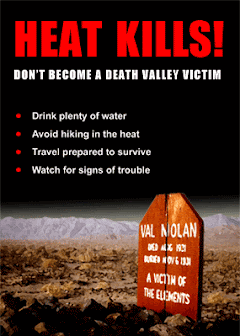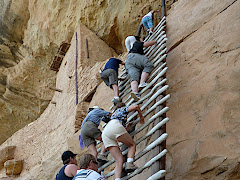death

Death Valley is the hottest place on Earth where the lowest temperature ever recorded in July stands at 69°F (21°C). The record highest temperature is almost twice that: 134°F (57°C). Only mad and Europeans visit outside the high season (November to March). 8am in October is the latest when you want to stay outdoors, and during hot autumn nights swimming pool may seem more inviting than your not-so-cheaply rented hotel bed.
vortex
Did they believe in vortexes as we do? asks 8-years old boy. We don’t know, USFS volunteer who shows us around the Palatki site patiently answers. This is a typical answer when it comes to ancient ruins and their builders in the American Southwest. The question however is only typical to Sedona where New Age belief in psychic influence of red phallic protrusions reins supreme. At least boy’s grandfather looks vaguely embarrassed.
volcano
Extinct volcanos are bound to be disappointing. We expect to arrive at the scene of a catastrophe. We end up admiring picturesque hills. I guess Pompeii is an exception: a city buried under ash, destructive power of the explosion preserving ancient artifacts for our benefit. I was thinking of Pompeii when touring Wupatki and Sunset Crater Volcano National Monuments. When the volcano here erupted sometime before 1100, Anasazi civilization was still very much present in the area. I envisioned pueblo-style buildings preserved in ash, hoping for something spared from well meaning, but misguided, 20th century archeologists. But this is not Pompeii. Inhabitants of Wupatki pueblo were not doing so great before the eruption. Porous desert soil, unable to hold water, was lacking nutrients due to over-cultivation. Ash from the volcano acted as a fertilizer and improved water-holding capacity of their fields. Researchers found imprints of corn ears in lava flow. The working hypothesis is that they were offerings intended to stop the eruption. But maybe we underestimate our predecessors: what if they knew the volcano was actually beneficial and fed it corn to keep it going?
reservation
If the land you are crossing is desolated yet captivating, then there is an excellent chance you are in what AAA calls the Indian Country. Misappropriation of the name aside the Indian country is where one comes to see incredible geological formations and to witness the progress of a 200 years experiment in civilizing natives. You may think that the concept of bringing the benefits of Western civilization to autochthons is a thing of the past, offensive to modern sensibilities. But consider the restrictions on alcohol on Navajo reservation. The federal government forbids sale of alcohol on Indian lands unless the tribe allows and the Secretary of Interior certifies it. For the rest of us the default option permits alcohol unless local community curbs it. Which is more common than you think: a waitress in Blanding, UT apologetically remarked it’s a dry town (and not because we were in the middle of the desert) when we tried to order beer with our dinner. The result, an utter lack of your favorite libation, is roughly the same but this is not a subtle distinction. Federal laws treat Indians like children. Just look at the extent of tribal jurisdiction over Indian country: the tribal court can only rule in case when both the victim and the perpetrator are Indians and only when the crime is a misdemeanor. Felonies and crimes affecting non-Indians are deemed to difficult to be left to native judges.
detroit
There was no war here. Nor a natural disaster. The lake did not flood the town as it did in New Orleans. The German army did not march in methodically burning houses like in Warsaw. No bombs were dropped. But you’d be excused to think something terrible must have happened. The place looks like the infamous lower 9th ward in the aftermath of Katrina. Houses are left deserted, boarded or burned. Furniture is rotting on a sidewalk. Roads are beyond repair. Abandoned cars are parked on driveways leading to nowhere. It’s not quite a ghost town: manicured lawns neighbor weed-overgrown ruins. A few residents appear out of nowhere and one starts waving in our direction. In all other places in US we would approach him and start conversation. Here we turn and speed away. If America has a failed city this is it. No wonder journalists flock here to shoot photos of ruin porn much to the annoyance of locals.
anasazi

Anasazi or Ancestral Pueblans as modern Pueblo Indians prefer to call them lived in the Mesa Verde for hundreds of years until late 1200s. And then they disappeared. More exactly they stopped building. Quite abruptly as testified by an unfinished Sun Temple. And similarly they abandoned the Chaco Canyon about hundred years earlier. What happened to them? Why did they leave? Where did they go? Professional and amateur archeologists have been attempting to answer those questions for 120 years now. No theory is entirely satisfying. For various reasons including political. Overpopulation and depletion of resources, advocated by Jared Diamond, doesn’t gel with the myth of Indians as good stewards following Mother Earth principles. When it is presented to Mesa Verde visitors it’s qualified by the occurrence of an ice age at that time. Drop in temperature is strangely at odds with artists’ renderings of mostly naked Indians peppering the park sites. But naked means savage and we, the descendants of the European settlers, are used to this excuse of the atrocities committed in the name of civilizing the indigenous population. Scholars disagree if it was great drought or ice age that explains the worsening of climate and forced the natives out. But you’d never know there is a controversy by reading literature provided by National Park Service.
b&b
We rarely stay in a bed-and-breakfast type of lodging. You never know if the owner is a sweet lady who is going to serve you fried eggs in the morning or a mis-employed prison guard who will track your every step with an evil glance and start vacuuming at 8am without bothering to switch off the deafening TV. On the subject of lodging: our friends suggested we try a place with magic fingers, but they are not easy to find. Nowadays even the oldest dump advertises its free broadband. At least this is what we prefer to think after seeing a sign proclaiming availability of a highspeed breakfast. These has to mean two separate and familiar things, right?